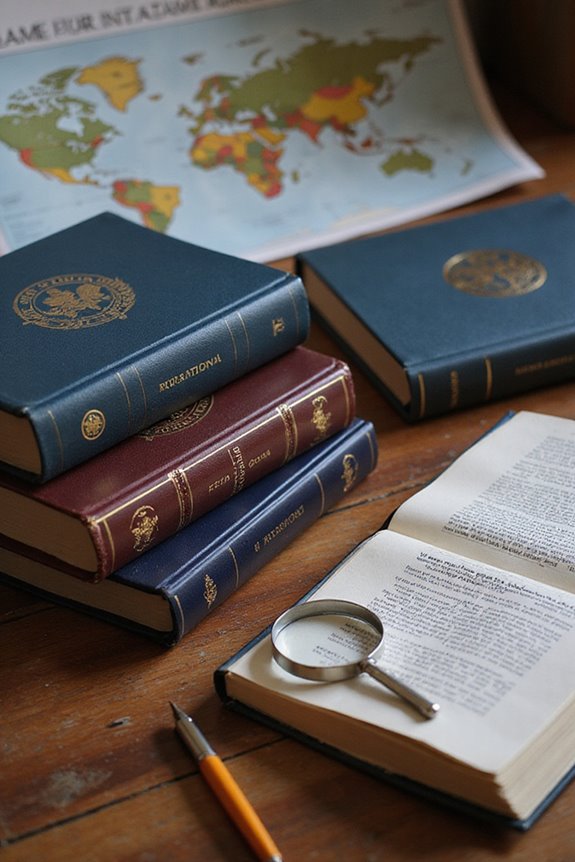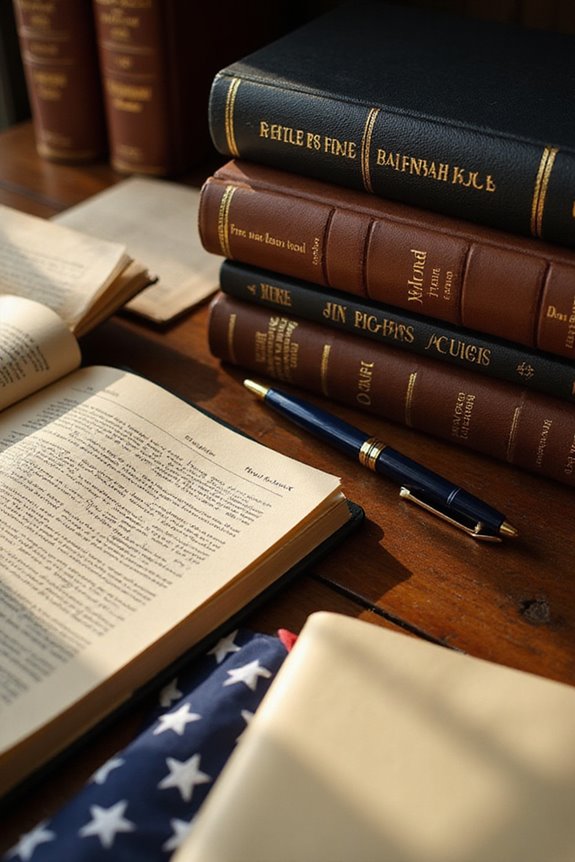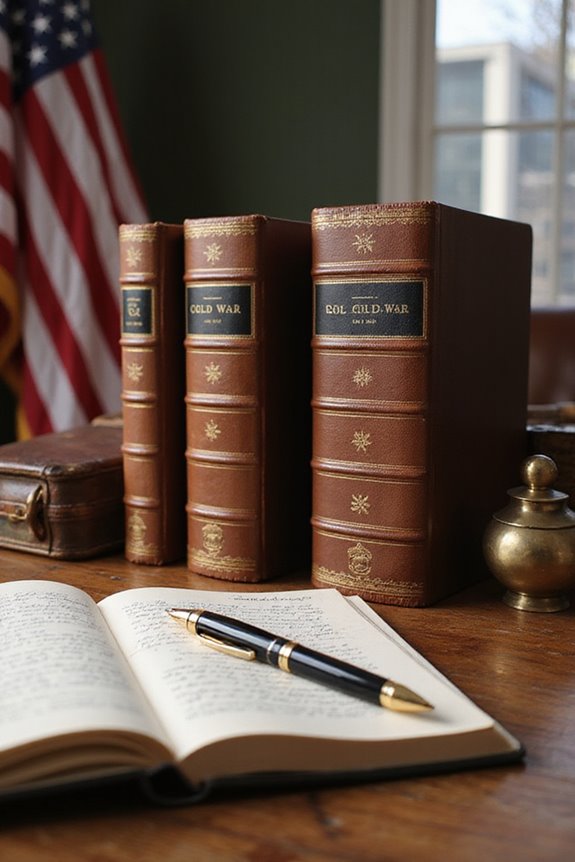Political books on international relations offer valuable insights into global dynamics. Here are some notable themes and titles:
- New Releases: Titles like *The Eurasian Century* and *Chaos Under Heaven* explore shifts in geopolitical power.
- Expert Recommendations: Works such as *Man, the State, and War* and *After Hegemony* discuss foundational theories of international relations.
- Contemporary Focus: Recent scholarship highlights the rise of multipolarity and the influence of nonstate actors.
Explore these themes further to understand the intricate relationships shaping our world.
Key Takeaways
- *The Eurasian Century* by Hal Brands explores historical shifts toward a multipolar world in international relations.
- Amitav Acharya’s *The Once and Future World Order* offers a 5,000-year perspective on declining Western dominance.
- *Chaos Under Heaven* by Josh Rogin analyzes U.S.-China policy struggles amid an emerging cold war context.
- Kenneth Waltz’s *Man, the State, and War* investigates the causes of war at individual, state, and international levels.
- Historical and post-colonial critiques emphasize the lasting impact of colonial legacies on contemporary global power dynamics.
Major New Releases on International Relations in 2025

As we look toward 2025, several major new releases on international relations are set to reshape our understanding of global power dynamics.
- *The Eurasian Century* by Hal Brands emphasizes how historical Eurasian events have primarily driven geopolitical power, signaling a shift toward a multipolar world order. This book resonates with themes from *Democracy Awakening*, which critiques the erosion of democratic values linked to historical patterns.
- Amitav Acharya’s The Once and Future World Order offers a 5,000-year perspective on the decline of Western dominance, contextualizing the rise of multipolarity.
- *Chaos Under Heaven* by Josh Rogin investigates U.S.-China policy struggles, highlighting the emerging cold war and its implications for geopolitical competition. The analysis parallels insights from *War*, which critiques U.S. foreign policy and explores the implications of global tensions.
- Patrick McGee’s Apple in China illustrates how corporate reliance on China intensifies Beijing’s global influence, reflecting the intersection of economics and geopolitics. Additionally, upcoming titles like *House of Huawei* will delve into the role of major corporations in shaping international relations, emphasizing how corporate strategies influence global power dynamics.
Authoritative Books Recommended by Experts

Understanding international relations requires engaging with authoritative texts that shape scholarly discourse. Expert recommendations highlight essential foundational theories that inform our understanding of global politics.
- *Man, the State, and War* by Kenneth Waltz analyzes war causes through three levels: individual, state, and international.
- *The Tragedy of Great Power Politics* by John Mearsheimer emphasizes power maximization in state behavior.
- *After Hegemony* by Robert Keohane discusses international cooperation despite anarchy.
- *Social Theory of International Politics* by Alexander Wendt focuses on the social construction of international reality.
- *International Norm Dynamics and Political Change* by Finnemore and Sikkink examines the emergence of international norms. This analysis reflects the importance of historical context in understanding how political ideas evolve over time.
These texts provide critical frameworks for analyzing contemporary international relations challenges and complexities, especially as the US’s challenged position in global affairs continues to evolve.
Thematic Focus on Geopolitics and Global Power Shifts

In today’s world, geopolitical dynamics are rapidly evolving, reflecting a significant shift in global power structures. We’re witnessing the emergence of a multipolar system, primarily driven by rising powers like China and India. This change is reshaping international relations and altering traditional power dynamics.
- The shift from West to East is evident, with wealth and economic influence transferring to Asia. LNG demand surged in 2024 and 2025, particularly in Asia and Europe, due to alternatives to Russian pipeline gas. Understanding these shifts through the lens of political economy is essential for grasping their implications on global stability.
- Nonstate actors are complicating these global structures, challenging established norms.
- Traditional Western alliances are weakening, as new players propose alternative geopolitical strategies.
- The U.S. remains powerful but faces diminished dominance, requiring careful trade-offs in policy.
These developments highlight the complex interplay between geopolitical strategies and global stability, emphasizing the need for adaptability in response to these changes.
Historical and Post-Colonial Perspectives in International Relations

Exploring historical and post-colonial perspectives in international relations reveals how past events and narratives shape contemporary diplomatic landscapes.
- Post-colonial critiques highlight the enduring effects of colonial legacies on global power dynamics.
- Non-Western histories introduce diverse regional viewpoints that challenge Eurocentric narratives in international relations.
- Significant historical events inform modern foreign policy and IR theory, emphasizing the importance of historical consciousness. Historical International Relations scholarship has significantly increased in sophistication, underscoring the need for a deep understanding of the past in shaping contemporary issues. Additionally, understanding political institutions is crucial to grasp the complexities of global governance and power structures.
- By examining the intersections of international law and diplomacy, we can better understand today’s international behaviors.
- Incorporating indigenous and non-industrial societies enriches our understanding of global relations, showcasing alternative political and technological systems.
Together, these perspectives foster a more thorough and equitable historiography of international relations, essential for grasping the complexities of our current global landscape.
Contemporary Case Studies and Policy Insights

Contemporary case studies in international relations provide valuable insights into the practical application of theoretical frameworks and policy decisions.
- Realism is evident in Cold War dynamics, showcasing the balance of power among states.
- Liberalism appears in climate diplomacy, where multilateral cooperation shapes shared environmental goals.
- Constructivism is highlighted by China’s evolving role in global health during COVID-19, reflecting the impact of geopolitical influences on health policies.
- The Balkan Wars exemplify the complexities of peacekeeping and ethnic conflict resolution, emphasizing the need for international coordination.
- Colombia’s dual peace process reveals the importance of internal negotiations beyond external interventions. Additionally, these case studies help in strengthening answer-writing by making responses more analytical and evidence-based.
These case studies not only illustrate theoretical concepts but also offer essential policy insights that can guide future international relations strategies. Understanding these dynamics is vital for effective diplomacy and conflict resolution.
Frequently Asked Questions
How Do I Choose the Right International Relations Book for My Needs?
When choosing the right book for our needs, let’s consider our goals and interests. We can explore book recommendations and reading strategies that align with our specific focus, ensuring we gain valuable insights and understanding.
What Are the Key Qualifications of Authors in This Field?
Steering through the domain of international relations authors is like charting a course through uncharted waters. Their expertise credentials and diverse author backgrounds guarantee they offer valuable insights, enriching our understanding of complex global dynamics and policy challenges.
Are There Online Resources or Forums for Discussing These Books?
Yes, there’re many online book clubs and discussion forums where we can engage with fellow readers. Platforms like Reddit and Facebook groups offer vibrant spaces to share insights and recommendations on various books.
How Can I Apply Insights From These Books to Current Events?
We can apply insights from these readings to improve our current events analysis by recognizing real-world applications of historical patterns, shifting power dynamics, and diverse perspectives, helping us navigate the complexities of today’s geopolitical landscape.
What Are the Differences Between Academic and Popular International Relations Literature?
When we explore the differences between academic and popular literature, we see academic rigor often contrasts with the focus on audience engagement in popular works. The former prioritizes depth, while the latter emphasizes accessibility and connection.






